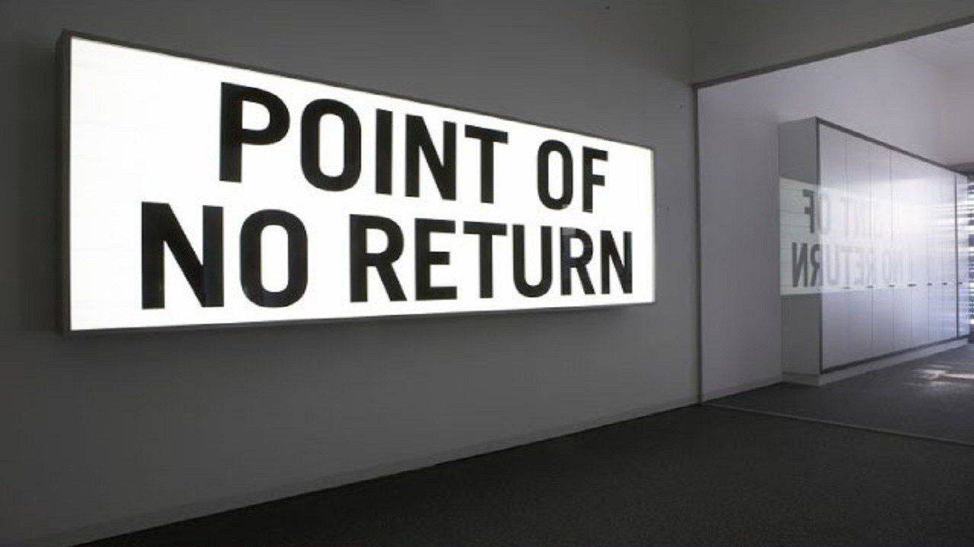
As a college undergraduate I was enamored of Existentialism, that most romantic and nihilistic of French philosophies. I wore black turtleneck sweaters, smoked Lucky Strikes, and channeled Albert Camus, but my senior thesis, a derivative sophomoric critique of Camus’ Myth of Sisyphus, drew a disappointing response from Louise Gould, my tiny, intense, chain-smoking, comparative literature advisor.
Professor Gould was absolutely right, and I still blush when I think of it. She was simply pointing out that quoting established critics is not the same as rigorous analysis based on personal research. My thesis did not reflect the critical thinking skills required and expected of a college senior.
That painful memory came back today as I thought about a different kind of existentialism. In aviation the point of no return is the point along the planned flight path beyond which an aircraft will no longer be capable of returning to the airfield of origin or a chosen alternate. Today’s existentialism is not an exercise in academic philosophy. It is not romantic though it may be nihilistic. Today’s existential moment turns on whether America is at or near its point of no return. If we can’t return to our base, what does our future look like? Where will our current course take us?

Several friends have asked me to leave the politics of Donald Trump outside these margins, and I understand how they feel. I’d rather not write about him but find it impossible to write about the country without commenting on current affairs. But, this existential moment is not about Donald Trump. He is a symptom of something bigger and more perilous – the collective lack of consensus, will, and imagination that has taken us, in less than 60 years, from being the most successful nation on earth to one that is a polarized, rundown, dysfunctional, and almost feudal in its current system of privilege and poverty.
When I write about anything, I try to find a positive note even when the subject is dark, but I find it increasingly difficult when writing about what’s happening in America today. During my short lifespan, I have seen the country rise to the pinnacle of modern nation-states and fall just as precipitously to its present status as a rudderless, degraded, and disrespected power–still feared but lacking in moral authority. We are no longer the admired and trusted leader of the free world. The reasons are many and complicated. The solutions, if there are any, will demand discipline, cooperation, and vast amounts of money.
Reclaiming our place among elite nations will require trillions of dollars and a national commitment greater than what was needed to put Neil Armstrong on the moon in 1969.
The US Treasury has been drained and needs to be replenished. Giant corporations and America’s richest individuals pay little or no tax. The richest among us are getting richer. More than half of all income growth since 1976 has ended up in the pockets of the top 1%. If we want quality services and policies to support them, we need to do a cost benefit analysis and make adjustments to the tax laws in order to raise the money needed to repair the damage caused by years of neglect and self-dealing.
If we are sincere in our desire to reclaim our place among nations we need solid, inspiring, leadership. We need to find a leader who will unify not divide us. We are better than identity politics. We are not an anti-Semitic, racist, white supremacist, or bigoted nation, but those voices will continue to be heard until there is a leader who brings Americans together and appeals to “our better angels.” I don’t see that leader yet, but I’m not giving up on finding him or her.
I’m positive a leader will emerge, but we can’t wait for inspiration. We must get to work now. America is literally coming apart at the seams. Think, if you will, about how these items have been degraded in your lifetime:
- Climate change: This is our biggest challenge. Time is of the essence. We are the only developed nation not a signatory to the Paris Climate Accords. As the world’s #2 contributor to greenhouse gas emissions we must rejoin the 175 signatories, reduce our emissions, and seek other solutions to remedy the situation. This is a survival problem.
- Infrastructure: America’s roads, bridges, rail lines, and airports are falling apart and need repair.
- Education: Early childhood, elementary and secondary education, vocational training, teacher salaries, and school infrastructure need to be improved.
- Healthcare: We spend more per capita than any other nation but rank 32nd in terms of healthcare outcomes.
- Immigration: Immigration reform is Congress’ responsibility. Properly drafted it can be humane and enhance national productivity. It is not an insoluble problem but it requires men and women of good will coming together to craft a policy that best serves the country.
- Gun ownership: the 2nd Amendment guarantees the right to bear arms, but there are more than 300,000,000 guns on the streets and in the homes of Americans. We can and need to regulate the purchase, ownership, and categories of firearms in order to reduce the number of gun related deaths and mass shootings.
It’s not a giant leap to find a metaphor for America’s situation in my long-ago love affair with Camus “existentialism.” Camus used the Greek legend of Sisyphus as a metaphor for the individual’s struggle against the absurdity of life. Sisyphus is condemned by the gods to repeatedly roll a boulder up a hill only to have it roll down again once he gets it to the top.
Today, we are at the bottom of the hill. If we gather together to push the boulder up the hill we may regain our former status. If we get there the boulder may roll down again. Life and governments move in cycles. Maybe Sisyphus is a metaphor for our cyclical lives. It’s possible we are not yet at the point of no return.
Camus acknowledged the absurdity of the situation but saw Sisyphus as the master of his own life. Perhaps that’s how we should see our situation. We can’t predict the outcome but it seems better to be the master than the slave, to make the effort rather than allow darker forces to divide us.
“I leave Sisyphus at the bottom of the mountain! His burden is always there. But Sisyphus teaches the higher loyalty which denies the gods and moves boulders. It is his judgment also that all is well. This universe, henceforth without master, appears neither sterile nor futile to him. Every grain of this stone, every glistening mineral of this night-filled mountain forms a world for him alone. The struggle itself toward the summit is enough to fill the heart of a man. We must imagine Sisyphus as happy.”
Jill Lepore in her book This America notes that “The United States began, not as a nation but as a confederation of thirteen states and before that a collection of colonies. The land had for tens of thousands of years been inhabited by people originally from Asia. It had been seized conquered and settled by people from Europe who brought with them people from Africa held in bondage. The thirteen colonies they established had little in common, so little that in 1775 John Adams remarked that they differed ‘almost as much as several distinct nations.’ The devising of an American ‘nation’ out of that past is pushing a cart uphill.” Definitely a Sisyphean challenge.
































It’s better to be happy in the struggle than to be angry or mean spirited.
Thanks for your comments and good spirit.
P.S. I think I may be even older than you. I was raised in the early 40s when we were taught the need to stand together for the sake of America and for our own character.